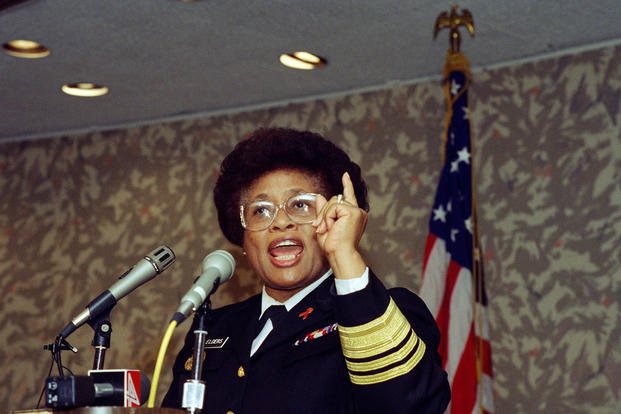Born Minnie Lee Jones in Schaal, Arkansas, on Aug. 13, 1933, Joycelyn Elders came from humble beginnings. She entered Philander Smith College in Little Rock at the age of 15 on a scholarship from the United Methodist Church. In college, she changed her name to Minnie Joycelyn Lee (later using just Joycelyn). She earned her bachelor's degree in three years while working as a maid to support herself.
In 1952, she received her bachelor's of arts in biology from Philander Smith College. Elders worked as a nurse's aide in a veterans hospital in Milwaukee until she enlisted in the Army in May 1953, using the name Minnie J. Jones.
She was sent to Brooke Army Medical Center at Fort Sam Houston, where she was the only Black person in her class. She was commissioned a second lieutenant in the Army Medical Specialist Corps in October 1953 and began her internship as a physical therapist.
She was stationed at Letterman Army Hospital in San Francisco and treated returning combat wounded from the Korean War, which ended in July 1953. In April 1954, Elders was licensed as a physical therapist and transferred to Fitzsimmons Hospital in Denver. She was one of two therapists who treated President Eisenhower after his heart attack. She resigned her commission in May 1956.
After her discharge, Elders attended the University of Arkansas Medical School on the GI Bill and obtained her M.D. degree in 1960. After completing an internship at the University of Minnesota Hospital and a residency in pediatrics at the University of Arkansas Medical Center, Elders earned a master's of science in biochemistry in 1967.
Elders then received a National Institutes of Health career development award, also serving as assistant professor in pediatrics at the University of Arkansas Medical Center from 1967.
She was promoted to associate professor in 1971 and professor in 1976. Her research interests focused on endocrinology, and she received certification as a pediatric endocrinologist in 1978. She became an expert on childhood sexual development.
In 1987, Elders was appointed director of the Arkansas Department of Health by then-Gov. Bill Clinton. Her accomplishments in this position included a tenfold increase in the number of early childhood screenings annually and almost a doubling of the immunization rate for 2-year-olds in Arkansas. In 1992, she was elected president of the Association of State and Territorial Health Officers.
President Clinton appointed Elders surgeon general of the Public Health Service on Sept. 8, 1993, becoming the first Black to serve in the position. As surgeon general, Elders:
- Argued the case for universal health coverage.
- Was a spokesperson for Clinton's health-care reform effort.
- Was a strong advocate for comprehensive health education, including sex education, in schools.
Elders was outspoken in her views and forced to resign after only 15 months in the position as a result of a controversial remark about sex education. Her last day in office was Dec. 31, 1994. She returned to the University of Arkansas Medical Center as professor of pediatrics.
Want to Know More About the Military?
Be sure to get the latest news about the U.S. military, as well as critical info about how to join and all the benefits of service. Subscribe to Military.com and receive customized updates delivered straight to your inbox.











